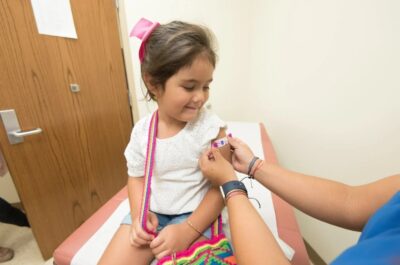
- Flu Prevention
Getting Your Child Their Flu Shot Now is More Important Than Ever

Throughout the COVID-19 pandemic, while people were wearing masks and social distancing, flu case rates were strikingly low. However, as we remained indoors, and children participated in remote learning, an unforeseeable consequence occurred: childhood vaccination rates declined.
Receiving routine vaccinations is imperative to children’s health as it helps their immune systems learn to identify and fight diseases and lessen the potentially serious effects of bacteria and viruses, like the flu. Getting vaccinated may also protect the people around you, including those who are more vulnerable to serious flu illness, like young children, older adults, and people with chronic health conditions. The CDC also encourages pregnant women to get their flu shot as it helps protect the baby for the first few months after birth as they are not eligible for a flu vaccine until six months of age.
This year, several countries in the Southern Hemisphere experienced an early and significant increase in influenza, with Australia seeing record monthly case numbers in May – double the month’s previous record set in 2019.
In Australia, the flu increase has mainly impacted teenagers and younger populations who have had lower vaccination rates. Sixty percent of flu hospitalizations have been in children under 16, with adults 65 years of age and older only making up less than 20 percent of hospital admissions. While cases of flu have since declined, Australia’s influenza cases may be an early warning sign for the U.S. since Southern Hemisphere influenza surveillance has historically been a strong predictor of influenza activity for the Northern Hemisphere flu season.
In order to prevent both mild and severe cases of influenza in children, the CDC recommends that all eligible individuals aged six months and older get an annual influenza vaccine to help protect themselves and their loved ones from potentially serious influenza complications.
According to the CDC, if your child is already at the doctor and is eligible to get their primary COVID vaccine series or booster and a flu shot, these two vaccines can be safely co-administered to help children protect themselves and loved ones from potentially serious illness or complications.
If you’re unsure if your child is up to date on their vaccinations, ask their health care provider, locate your child’s vaccine records, and/or schedule an appointment.
With the 2022/23 Northern Hemisphere influenza season in full swing, it’s important that we do everything we can to ensure as many people as possible get vaccinated against the flu — and that starts with you.
This article was written by Dr. Gregg Sylvester, Chief Health Officer, CSL Seqirus


